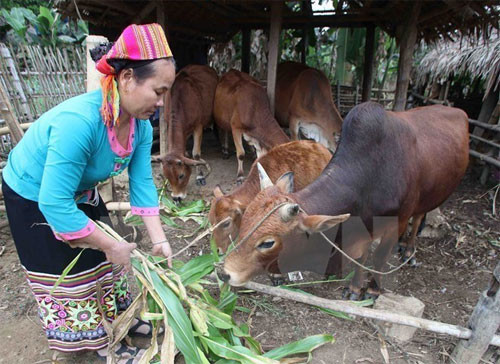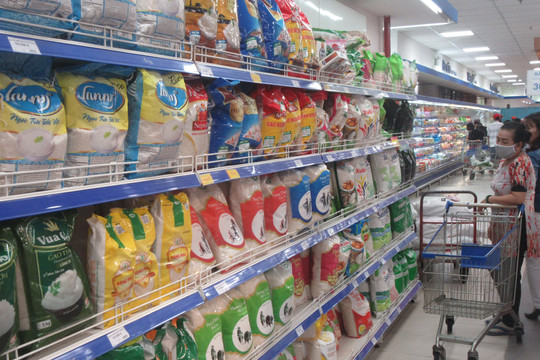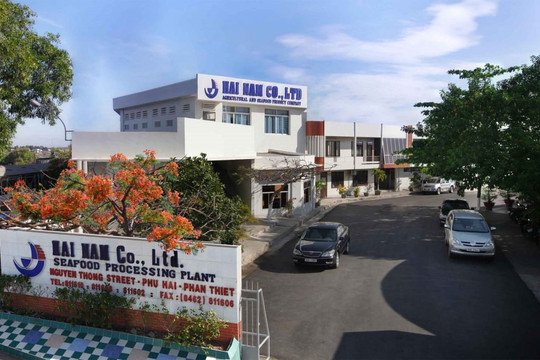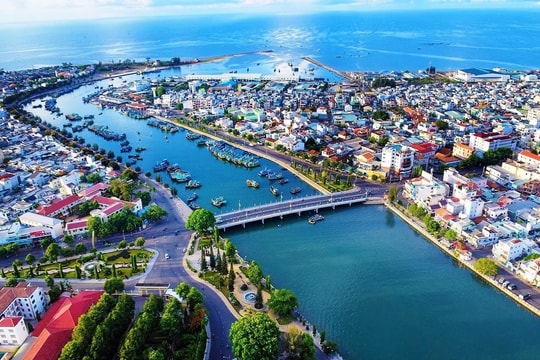 |
Vietnam has gained a lot of significant achievements in SDG on poverty
reduction (Illustrative image. Source VNA)
The event is part of a conference themed “The National Assembly and sustainable
development goals”.
A wide range of issues were discussed at the meeting, such as climate change
adaptation, poverty reduction and elimination, food security guarantee,
sustainable agriculture development, gender equality, and female and youth
empowerment.
Deputy Minister of Natural Resources and Environment Vo Tuan Nhan said that
Vietnam is considered one of the countries bearing the most brunt in terms of
climate change impact. According to Vietnam’s climate change research, if the
sea level rises by one metre in the late 21st century, about 10-12 percent of
its population will be directly affected and the country could lose around 10
percent of its gross domestic product (GDP).
Therefore, Vietnam will face a lot of significant challenges in the
implementation of SDGs on climate change, he said, adding that Vietnam has to
realise its goals on emissions reduction as committed from 2021 while still
maintaining high economic growth.
In addition, climate change in Vietnam has become more complicated and
unpredictable, unraveling quicker than predicted and impacting heavily on the
people and climate change-sensitive sectors.
The use of water and the development of hydropower plants for countries in the
upper part of the Red River and Mekong River have been exerting great impact on
Vietnam, especially in the Mekong Delta. These have been exacerbating the
effects of climate change by increasing floods, droughts and salt water
intrusion, Nhan said.
Realising these challenges, the Party, National Assembly and Government of
Vietnam have promulgated many important policies to cope with climate change.
Vietnam has been consistent in improving its institutions, policies and laws to
actively respond to climate change, promote green growth, and reduce carbon
emissions.
The Government has issued a national action plan on implementing the UN agenda
2030 for sustainable development; a resolution on the sustainable development of
the Mekong Delta in adaptation to climate change; a target programme and
national strategies on climate change and green growth; and a plan to implement
the Paris agreement in Vietnam.
Vietnam also has gained important outcomes in poverty reduction thanks to the
leadership of the Communist Party of Vietnam; the regular directions of the
National Assembly and Government; and the joint efforts of all sectors and
society, according to Deputy Minister of Labour, Invalids, and Social Affairs Le
Tan Dung.
He cited that the rate of poor households throughout the country reduced from 58
percent in 1993 down to 7 percent in 2017. Essential infrastructure in poor
districts, communes and ethnic minority-inhabited regions have been improved, as
well as the locals’ living standards and assessment of social services.
Vietnam’s achievements in this field have been recognised by the international
community. The UN evaluated Vietnam as one of the countries with the most
impressive poverty reduction accomplishments during the implementation of the
organisation’s Millennium Development Goals.
Besides the positive outcomes, challenges in poverty reduction and social
welfare still lie ahead, especially in the realisation of the SDGs on poverty
elimination through 2030, the official said.
Specifically, the speed of poverty reduction is uneven and unsustainable,
particularly in the northern mountainous and Central Highland regions.
Ethnic minority households accounted for 52.66 percent of the total number of
poor households nationwide, according to statistics in 2017. The average income
of ethnic minority households was equal to just 40 percent of the national
average.
To further the achievements that Vietnam has gained in poverty reduction and
social welfare, the country will continue reviewing and supplementing policies
in the field; focusing on supporting production development; increasing incomes
for poor households; and helping needy people gain access to social services,
healthcare, education, accommodation, clean water, information, and
infrastructure development.
According to Deputy Minister of Agriculture and Rural Development Le Quoc Doanh,
agriculture plays an important role in Vietnam in ensuring food security for
nearly 95 million people, as well as livelihoods for nearly 65 percent of the
country’s population living in rural areas, making up 15.34 percent of the GDP.
Vietnam exported a variety of agro-forestry products in 2017 worth 36.52 billion
USD, and the figure is projected to hit 40 billion USD in 2018. There are 10
groups of commodities having the annual export turnover of 1 billion USD or
more, with fruit, cashew nuts, coffee, shrimp and timber products registering
export values of more than 3 billion USD. Vietnamese farm produce are now sold
in 180 countries and territories around the world. Vietnam ranks second in the
Southeast Asian region and 15th in the world in exporting agriculture products.
However, the agriculture sector has been faced with a lot of difficulties and
challenges in ensuring food security and sustainable development, Doanh said,
adding that small-scale production remains a major challenge to realising the
country’s targets of modernisation and industrialisation, as well as increasing
the quality of agriculture products for nearly 102 million people in 2025, and
107 million people in 2030.
The complicated development of climate change has exerted negative impact on
agricultural production and threatened food security, not to mention the
increasingly scarce land, labour and capital sources. This requires long-term
strategies to mitigate damage, Doanh said.
To address difficulties, the ministry will focus on restructuring the
agriculture sector, reforming growth models, and building new rural areas
towards developing high-tech, clean and organic agriculture in association with
the processing industry and sales of agriculture products.
The ministry will boost the transfer and application of high technology to
create breakthroughs in the productivity and quality of animals and plants;
ensure food safety and hygiene; and increase the competitiveness of the sector,
Doanh said.
President of the Vietnam Association for the Protection of Children’s Rights
Nguyen Thi Thanh Hoa said that in recent times Vietnam has gained positive
outcomes in implementing the SDGs on children, women and gender equality.
Vietnam continues to use 20 percent of the State budget spending on education.
All children under six years old are granted free health insurance cards. The
rate of malnourished children has been reduced to 13.1 percent.
Women make up over 48 percent of the labour force in Vietnam, with 31.6 percent
of business owners being female. The current rate of female National Assembly
deputies in the ongoing 2016-2021 term is 26.71 percent, 2.62 percent higher
than the previous tenure.
The Government has promulgated a number of programmes and projects to promote
gender equality, including consideration over reducing the retirement age gap
between men and women.
In the coming time, Vietnam will fine-tune its legal system and policies for
child protection, Hoa said.
Source: VNA

.jpg)


















.jpg)





.jpeg)

.jpeg)


.jpeg)

